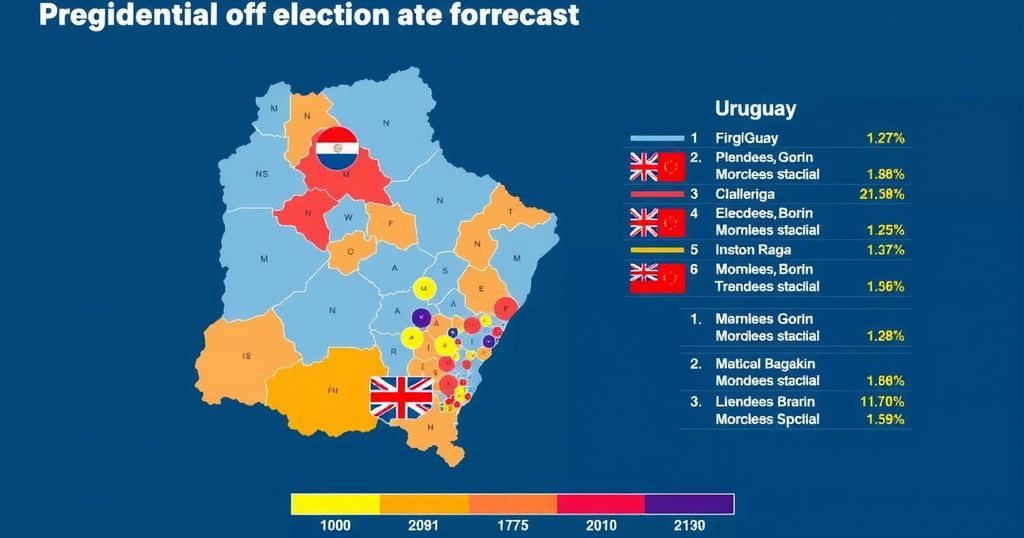Uruguay Moves Towards Presidential Run-Off With Leftist and Centre-Right Candidates
Polling stations in Uruguay closed, with predictions indicating a run-off vote in the presidential race set for November 24. Candidates include Yamandu Orsi of the centre-left Frente Amplio party and Alvaro Delgado of the centre-right Partido Nacional, following their respective votes of 43.2% and 28%. The elections showed general voter satisfaction with the government but highlighted prevalent concerns about crime. Furthermore, referendums regarding retirement age and police powers were likely rejected by the voters.
In the recent presidential elections in Uruguay, polling stations closed with forecasts indicating a likely run-off vote scheduled for November 24 between Yamandu Orsi, representing the leftist Frente Amplio party, and Alvaro Delgado from the centre-right Partido Nacional. Orsi, a former history teacher and local mayor, garnered approximately 43.2 percent of the votes, while Delgado, a veterinarian, secured around 28 percent, according to estimates provided by Equipos Consultores. Furthermore, Andrés Ojeda, a media-savvy lawyer, finished in third place, receiving 15.5 to 16 percent of the votes. Significantly, this election has diverged from the prominent right-left political shifts witnessed throughout Latin America, including in countries such as Argentina and Brazil. Here, the primary candidates exhibit considerable overlap in their policy positions. Voters have expressed general satisfaction with the current administration, led by President Luis Lacalle Pou of the Partido Nacional, who maintains a 50 percent approval rating despite facing challenges regarding rising crime rates linked to drug trafficking. Additionally, it is noteworthy that the electorate voted on referendums related to the retirement age and police operations, both of which appeared to have been rejected according to early exit polls. This pivotal election is crucial, as a victory for Orsi would signify a leftward shift in Uruguay after five years of conservative governance. Former President Jose “Pepe” Mujica, who is now battling health issues, has actively participated in the campaign, demonstrating his enduring influence in Uruguayan politics. Overall, the upcoming run-off promises a continued engagement of Uruguayan citizens in shaping their political landscape in a context where traditional party lines are increasingly blurred.
Uruguay’s current political landscape reflects a unique situation in contrast to broader regional trends where sharp right or left partisan divides are prevalent. The elections occurred amidst a backdrop of relatively stable economic conditions and substantial public approval of the incumbent government, which, however, grapples with concerns over crime. With an electorate of approximately 3.4 million, Uruguay is witnessing a critical juncture where citizens are deciding on policies affecting various aspects of their lives, such as governance, security, and social issues.
In conclusion, Uruguay’s presidential election has led to a forecasted run-off between candidate Yamandu Orsi and Alvaro Delgado, marking a significant moment in the nation’s political history amidst regional shifts. The early rejection of critical referendums and the focus on pressing issues such as crime illustrate the variance in political sentiments among the electorate, highlighting the continued evolution of Uruguayan democracy. Furthermore, the potential implications of the run-off could herald a shift toward leftist governance, steering the country into new policy directions after years of conservative leadership.
Original Source: www.aljazeera.com




Post Comment